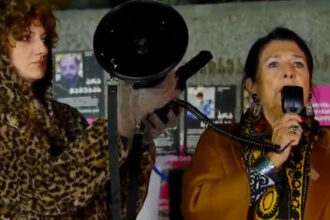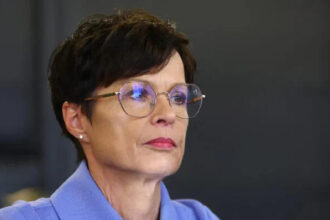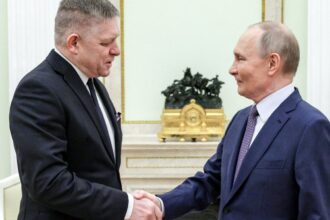British diplomat Gareth Ward reflects on his first months as ambassador of the United Kingdom to Tbilisi. He has focused on expressing our concerns about the democratic backsliding, and anti–Western rhetoric.
In an exclusive interview, the ambassador noted that the Georgian government’s actions this year have deteriorated the country’s relations with western partners. According to him, London’s official is disappointed that the leaders of the “Georgian Dream”, who have started spreading conspiracy theories and making assumptions that Western partners undermine Georgia, have begun spreading conspiracy theories.
Gareth Ward, the British Ambassador to Georgia, spoke exclusively with “Interpressnews” about the UK’s assessment of the Georgian foreign policy and the prospects for the country joining Euro-Atlantic allies.
You were appointed ambassador of the United Kingdom in Georgia by the British government in July this year. How would you rate your first few months in Georgia? What are the main issues you have worked on and what is your official position as a representative of the United Kingdom regarding the current situation in Georgia?
I began preparing for my posting to Georgia last year. I was optimistic at the time about what we could accomplish together. I hoped that we could strengthen our bilateral cooperation, as Georgia pursues a Euro-Atlantic path and has a strong economic outlook. The UK has been a leading supporter of Georgia, especially in the areas of cyber security, defense, and NATO integration. It is also a strong advocate for Georgia’s sovereignty. I thought we would work together to increase Georgia’s resilience and our mutual success. In the last year, the Georgian government has taken a different approach. I spent my first months in Tbilisi expressing our concerns about the backsliding of democracy and anti-Western rhetoric. I hope that the Georgian government will change its approach and allow me to return my optimistic vision.
The country’s foreign policy is one of the most pressing issues in Georgia. There is a general opinion that the Georgian government has departed from its western course. How does the official London evaluate the Georgian government’s foreign policy transformation?
The Georgian government’s actions this year have damaged the UK-Georgia partnership, just as they have Georgia’s relationship with many other Western countries. We were concerned that the Georgian Parliament had adopted legislation restricting civil society after seeing the public’s strong opposition. We were disappointed that Georgian Dream leaders began to promote conspiracy theories, and suggested that western partners were undermining Georgia. We were shocked to learn that the Georgian Dream manifesto called for a ban on all opposition parties. We decided to freeze these talks for the first 10 years of our bilateral Wardrop Dialogue. We haven’t held our planned Defence Staff meetings, and we’ve paused any new cyber security programs. We hope that after the elections, whoever the Government is, we will see clear evidence of the return to the Euroatlantic track to rebuild trust and to return to a closer partnership.
European politicians point out often that the process of Georgian integration into Europe has been stopped. What do you think about the fact that Georgia has been pushed back from the forefront of the Euro-Atlantic alliances?
The UK does not directly participate in Georgia’s EU membership process, but we do support this ambition and the reforms which should accompany it. The UK has always been a strong NATO ally and has actively supported Georgia’s NATO aspirations. The UK is, along with Romania, the NATO contact country for Georgia. We offer a wide range military training and defence capability building. NATO is not only a military alliance, but also a political one. The Georgian government must also show its commitment to a free media, human right, and parliamentary oversight, as well as an independent judiciary. The NATO Secretary General expressed concerns about the Foreign Influence Law in the beginning of this year. The path towards NATO cannot be compatible with measures that undermine democracy and human right.
There are less than two weeks left until the Georgian parliamentary elections. How would you rate the pre-election climate in the country?
The Georgian people must have the right to elect their government in fair, free and competitive elections. We will provide 50 observers to ensure the OSCE/ODHIR election monitoring mission has adequate resources, and we will also support several local election monitoring NGOs. They will play a key role in the upcoming elections, and should give the Georgians confidence that their voice can be heard at the polling station.
– On 1 August, the Law “On Transparency of Foreign Influence” entered into force in Georgia. You have mentioned the law several times. I would like to ask a separate question about this. The law requires non-governmental organizations and media to register at the National Public Registry Agency (NPRA) as “organizations carrying the interests” of a foreign power if they receive more than 20% of income from abroad. The content of the law is what causes partners of Georgia to criticize it. Could you please explain what you consider to be incompatible with democracy about the law you mention?
We have stated that we believe the Foreign Influence Law is harmful to NGOs and free media. It is disproportionate, stifles freedom of speech and stigmatises those who do good for their communities.
On October 3, Shalva Papuashvili, the chairman of the parliament, signed a law entitled “On Family Values and Protection of Minors”. You called it “regrettable”, and wrote in the social network, that “it undermines fundamental human rights including freedom of expression and meeting”. What is your basis for believing that this is a danger to the citizens of Georgian?
The Family Values Law discriminates and restricts the freedom of expression. Georgia, in my experience, is a tolerant country with a vibrant NGO community. These laws are against this trend, as well as the common European values, such as those set forth by the Council of Europe.
Beka Beriashvili
Interpressnews
Read More @ www.interpressnews.ge




